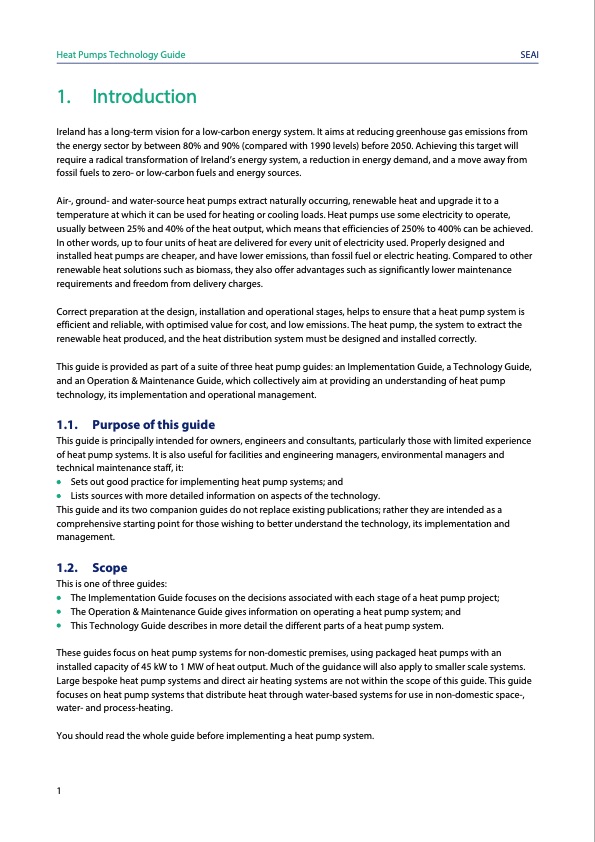
PDF Publication Title:
Text from PDF Page: 005
Heat Pumps Technology Guide SEAI 1. Introduction Ireland has a long-term vision for a low-carbon energy system. It aims at reducing greenhouse gas emissions from the energy sector by between 80% and 90% (compared with 1990 levels) before 2050. Achieving this target will require a radical transformation of Ireland’s energy system, a reduction in energy demand, and a move away from fossil fuels to zero- or low-carbon fuels and energy sources. Air-, ground- and water-source heat pumps extract naturally occurring, renewable heat and upgrade it to a temperature at which it can be used for heating or cooling loads. Heat pumps use some electricity to operate, usually between 25% and 40% of the heat output, which means that efficiencies of 250% to 400% can be achieved. In other words, up to four units of heat are delivered for every unit of electricity used. Properly designed and installed heat pumps are cheaper, and have lower emissions, than fossil fuel or electric heating. Compared to other renewable heat solutions such as biomass, they also offer advantages such as significantly lower maintenance requirements and freedom from delivery charges. Correct preparation at the design, installation and operational stages, helps to ensure that a heat pump system is efficient and reliable, with optimised value for cost, and low emissions. The heat pump, the system to extract the renewable heat produced, and the heat distribution system must be designed and installed correctly. This guide is provided as part of a suite of three heat pump guides: an Implementation Guide, a Technology Guide, and an Operation & Maintenance Guide, which collectively aim at providing an understanding of heat pump technology, its implementation and operational management. 1.1. Purpose of this guide This guide is principally intended for owners, engineers and consultants, particularly those with limited experience of heat pump systems. It is also useful for facilities and engineering managers, environmental managers and technical maintenance staff, it: • Sets out good practice for implementing heat pump systems; and • Lists sources with more detailed information on aspects of the technology. This guide and its two companion guides do not replace existing publications; rather they are intended as a comprehensive starting point for those wishing to better understand the technology, its implementation and management. 1.2. Scope This is one of three guides: • The Implementation Guide focuses on the decisions associated with each stage of a heat pump project; • The Operation & Maintenance Guide gives information on operating a heat pump system; and • This Technology Guide describes in more detail the different parts of a heat pump system. These guides focus on heat pump systems for non-domestic premises, using packaged heat pumps with an installed capacity of 45 kW to 1 MW of heat output. Much of the guidance will also apply to smaller scale systems. Large bespoke heat pump systems and direct air heating systems are not within the scope of this guide. This guide focuses on heat pump systems that distribute heat through water-based systems for use in non-domestic space-, water- and process-heating. You should read the whole guide before implementing a heat pump system. 1PDF Image | Heat Pumps Technology Guide

PDF Search Title:
Heat Pumps Technology GuideOriginal File Name Searched:
Heat-Pump-Technology-Guide.pdfDIY PDF Search: Google It | Yahoo | Bing
CO2 Organic Rankine Cycle Experimenter Platform The supercritical CO2 phase change system is both a heat pump and organic rankine cycle which can be used for those purposes and as a supercritical extractor for advanced subcritical and supercritical extraction technology. Uses include producing nanoparticles, precious metal CO2 extraction, lithium battery recycling, and other applications... More Info
Heat Pumps CO2 ORC Heat Pump System Platform More Info
| CONTACT TEL: 608-238-6001 Email: greg@infinityturbine.com | RSS | AMP |